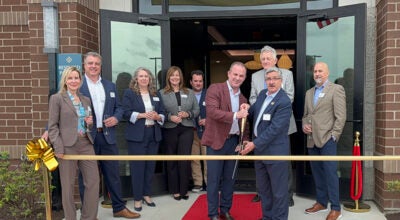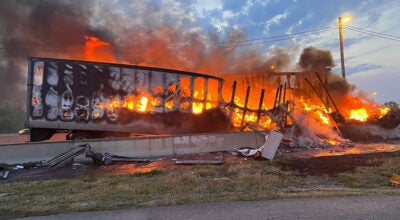A Q&A on police tactics
Published 9:17 pm Friday, July 31, 2020
|
Getting your Trinity Audio player ready...
|
Editor’s Note: After the deaths of Breonna Taylor and George Floyd and protests that turned violent in many areas of the country, the News-Herald sat down on June 9 with then-Police Chief Thomas Bennett to talk about no-knock warrants, restraint and arrest techniques, riot control tactics and more. Also present were Deputy Chiefs J.D. “Danny” Buie, Alfred Chandler and Cassandra Garvin.
The next day, Bennett announced his retirement, and Chandler was announced as interim chief the day after that. After much consideration, we feel the interview is still newsworthy, as the policies discussed in the interview are still in force and Buie, Chandler and Garvin are still providing leadership for the department.
Bennett was provided most of the questions in advance, but a few evolved during the interview. The answers have been edited for length and clarity.
This is Part 3 of 3. Part 1 was published July 26; Part 2 was published July 29.
Besides National Night Out, what does Suffolk Police Department do to improve relations with the community?
Bennett: We do a million things. We go to all the civic league meetings and interact and talk about what the problems are in the neighborhood. That is a big hit. We do senior citizens academy. We do two or three kids’ programs. We were just getting ready to start redoing our Explorer program, but it had to be put on hold due to COVID-19.
Chandler: We also have a curriculum called Virginia Rules. Our school resource officers teach that inside the high schools. It teaches the young people about the rules for the commonwealth of Virginia, what they can and can’t do, the difference between a misdemeanor and a felony, their rights. Our School Resource Officer program in general, being able to reach out to the kids and build relationships with them. We also have a flag football team and basketball team that we dust off at different events.
Bennett: We have had officers in the schools for a long time here in Suffolk, in all the high schools and all the middle schools. The relationships that our people build with the kids and develop that last way past high school is invaluable in our opinion. I have seen that some places in this country are getting rid of school resource officers. I cannot tell you what a big mistake I think that is. I would be very opposed to our people not being in the schools. I would hate to see that ever happen in this city or any city.
Buie: We do provide training. We’ve done active threat training for people in the community, churches, businesses, all over the city. The Dog Walker Watch program, we provided that training two or three times for citizens. That’s big in building rapport with citizens and getting that partnership built.
Garvin: We have tried to up our social media game. For Black History Month, we profiled a lot of our African American officers. We did the same thing with a lot of our female officers for Women’s History Month. We really do want the community to know about us. We send officers out to a million speaker requests. Every year around Halloween time, we do trunk or treats every weekend. We also publish an annual report every year, and it’s on our website. We really try to be an open book.
Chandler: More than what we do is how we do it. We tell our officers they’re a driving billboard, and they’re the best face of the department we can give. When officers are working a game or they’re working traffic or they’re working Peanut Festival, the expectation is they will get out and meet people. In parades, even in protests, we get out and meet people. We’re not policing the community, we are a part of the community.
Garvin: We want to be reflective of our community. We do actively recruit for people who are from Suffolk. I love nothing better than getting a Suffolk-born-and-bred file across my desk that we can get in here.
Let’s talk about your use of cameras.
Bennett: We have recently completely updated our interview rooms in headquarters with the most modern audio and video recording devices we can. Every time we take somebody in there and interview them, it gets recorded.
Early last year, I spent a considerable amount of money from our asset forfeiture account to put in-car cameras in every single patrol car on the street. It’s a camera in front, but we also have a camera in the backseat, an infrared camera, that sees really good in the dark when people are sitting in the back seat. So if they’re kicking out the window or performing or confessing, we’ve got it on tape.
We just upgraded all of our body cameras. When we hit our lights or we open our door, the body camera comes on. We have a device called Signal Sidearm. It turns the body camera on when the gun comes out of the holster. Whenever the lights are on, the door is open or a gun is unholstered, it turns on not only that officer’s body camera but also all others within 30 feet.
We have a policy that governs use of the body camera. The policy requires officers to cut on the body camera in certain situations, like law enforcement encounters. For example, a traffic stop; for example, I get a call to come to your house in reference to a domestic, when you open the door, you’d better smile because you’re on ‘Candid Camera.’ We go to great lengths to make sure that camera is cut on. There’s still a few little holes that can happen where it doesn’t come on, but those situations are few and far between. When they do happen, the officers are disciplined.
We’ve really gone out of the way and spent a little bit of money to make sure our body camera program is A-1, and I think it is.
Is there anything else you want to talk about?
Bennett: This is my personal opinion on police reforms. There’s some things I think we need to do in this country, a few of them in this state, to make policing better. I think there are some things we need to reform. Some of them aren’t going to be popular and some people might get mad at me, but I don’t care. Police unions are protecting bad employees — fact. Police chiefs in the northern part of this country, especially the northeast corridor, the unions are so strong up there they can hardly even fire anybody, much less discipline them. That’s an issue, and it needs to be fixed.
The reason we do accreditation is because it’s all about best practices in policing. We do that and we get inspected, we have to do that. I think somehow or another we have to make more police departments in this country get accredited to bring up their level.






